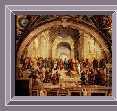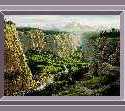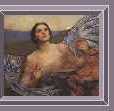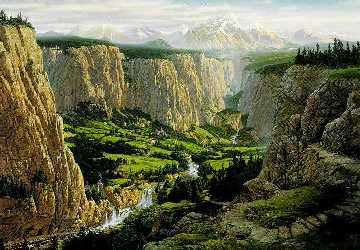Tolkein and the Several Dwarves
J. R. R. Tolkein
Often considered the "Father of High Fantasy," J. R. R. Tolkein's several books of Middle Earth are rightfully well-beloved. Combining adventure, quests, archetypes, language and Catholic Christian morals, Tolkein towers above all of modern fantasy.
His works, therefore, are unabashedly recommended.
The Lord of the Rings Trilogy
Terry Brooks
Best known for his Shannara series, Terry Brooks is often identified, by Tolkein fans, as "the guy who ripped off Tolkein." Regardless, the original Shannara trilogy, as well as its sequel quatrilogy (the Scions of Shanarra series) are fairly good in plot, language, and morals. The good people are good, the bad people are bad.
The further prequels and sequels (indicitive of the genre's newest trend of dead horse beating) are best approached with caution. Those who enjoyed his Shanarra stories will be tempted to gobble these up as well - however Druidism as well as other questionable wordviews are introduced here.
The same, unfortunately, applies to his Magic Kingdom for Sale - SOLD! series of books, which are weak in plot, language and morals.
His other works appear to degenerate.
Robert Jordan
Another of the dwarves, Jordan is reknowned for his Wheel of Time series, which, apparently, will conclude sometime after his death. For those who want to read an entire series now, Jordan's ongoing cycle will prove frustrating. For those who don't mind, I can only give a hesitating encouragement. Being of the former disposition, I have not read the books, but a household sister of mine (Theology/Literature major) has this to say:
Terry Goodkind
One of the newer dwarves, Goodkind's books - thick novels with neat-o paintings on them - at first look to be just another romp through a poorly researched or realised Medieval Age, but they are quite the opposite.
Stay away from his books entirely.
David Eddings
A curious fellow this, and deserving of more than a minute's notice.
Like the recent upsurge for Rowling's Harry Potter (yes, a whole page will eventually be devoted to these @!(#* books), Eddings' most well-known and beloved books, the Belgariad and the Malloreon (a decology masquerading as two pentologies), along with its two prequels, Belgarath the Sorcerer and Polgara the Sorceress, and the recent, forget the dead horse, beat the dead cow appendix, The Riven Codex are hard to place.
The series is amusing, fun, a wild good romp, free from sex, swearing, excessive violence, and the good guys are good the bad guys are bad. Or so it appears on first, twelfth, even twentieth reading. The characters are likable, the theology not too wildly different (at first glance), the style easy though not impressive, the pace quick, the thought process required minimal. These are fun books, and I recommend the majority of them (saving Polgara and the Codex - both of which are poorly written on top of everything), so long as the following is kept in mind.
These books are subversive - but only after really extended contact with them. You are called upon to root for a thief, a drunkard, and a slew of happy-go-lucky warriors who enjoy killing their enemies. Little quips of morality are thrown in, anti-serfdom, for example - but much of that morality is near obsolete from daily Western life, and therefore is as helpful as rock candy. More than anything, though, the theology is dualistic (Neitzsche's rotten legacy to the West, "good" and "bad," "light" and "dark" are "relative" terms. Ptooey) - yet the characters and the gods themselves are so likeable, that subconsciously the reader attempts to reconcile the two theologies. I mean, UL is like God the Father and Aldur is kind of like Jesus - only, maybe more like St. Raphael or something - and Eroind is more like Jesus, yeah! And Torak is obviously Satan, so that's OK. And we'll just sort of ignore the other gods. Yeah, yeah. See what I mean?
Therefore the recommendation is this, if your looking for a romping good fun high fantasy quest novel, you can't go much wrong reading The Belgariad and The Malloreon (and maybe even Belgarath the Sorcerer if you're not sick of Eddings yet). However, take time either before, during or after to consider what Eddings is actually advocating.
Young Garion is sent on a quest to kill the dark god Torak by recovering Aldur's Orb and finding the young (good) god, thereby restoring order to the world.
The Malloreon
Garion, all grown up now, must battle the dead Torak's crazy acolyte in a final battle between dualistic "light" and "dark."
(c) 2000
 The Hobbit
The Hobbit
Literary Quality:
A prequel to The Lord of the Rings, this book chronicals Bilbo Baggins (the Hobbit) discovery of the Ring itself, which will turn the wearer invisible, but at the price of obsession. En route, he encounters Orcs, dwarves, a wizard named Gandalf, and a fearsome dragon named Smaug, as well as a creepy and mysterious character, Glolem.
Christian Morality: Excellent
Age Appropriateness: Pre-Teen
 The Fellowship of the Ring
The Fellowship of the Ring
 The Two Towers
The Two Towers
 The Return of the King
The Return of the KingLiterary Quality:
Frodo, the newphew of Bilbo, comes into possession of the Ring, which he must destroy before its power overwhelms him. Also involving a lost king, a power-crazed wizard, and a good old-fashioned romance. Might be a little scary at times for younger children.
Christian Morality: Excellent
Age Appropriateness: Pre-Teen/TeenagerLiterary Quality:
Everything you ever wanted to know about Middle Earth's History is here...and in several other books Tolkein's son edited. A great companion piece to LOTR; better approached as a scholarly work than a story.
Christian Morality: Excellent
Age Appropriateness: Teenager
 The Sword of Shannara
The Sword of Shannara
Literary Quality:
The first of the Shannara books. Shea Omsford is sent on a quest to find the Sword of Shannara, which will drive back the forces of evil. Fairly good, but ponderous in historic detail. 
Christian Morality: Good/Harmless
Age Appropriateness: Pre-Teen/TeenagerLiterary Quality:
The first of the Heritage of Shannara books. The next generation must fightback the evil which is again threatening the land. Four separate adventures in the four books; each a stand-alone. Fairly good; series can stand alone from the original trilogy.
Christian Morality: Harmless
Age Appropriateness: Teenager"I like Jordan's books on a plot complexity level, but they are very much into ying-yang type eastern mysticism in the magic and fate on a religious level, and polygamy (nothing explicit), excessive gambling and drinking on a moral level. I would definitly place it no higher than indifferent on the morality scale, and maybe suggest an Adult readership. It is interesting from a male/female role point of view (the males are subjected, but breaking free--hm, wonder if it is an underhanded anti-feminist story?)"
~Cynthia
© 13 April, 2000
 The Eye of the World
The Eye of the World
Literary Quality:
The first book in the continuing adventures of The Wheel of Time...trilogy? Sextology? Dodecahedrology?...series. Yet another young-boy-saves-the-world-from-imminent-peril.
Christian Morality: Harmless/Dangerous
Age Appropriateness: AdultLiterary Quality:
They contain graphic sexual deviation, as well as explicit sado-masochism. Considering both of these, no books will be referenced below.
Christian Morality: Offensive
Age Appropriateness: Inappropriate
The Belgariad
Eddings also has another series of books which are not recommended for the reader who is young in the Faith. The Elenium and the Tamuli, Literary Quality: (
Literary Quality:

Christian Morality: Harmless/Dangerous
Age Appropriateness: Pre-Teen/Teenager Pawn of Prophecy
Pawn of Prophecy
 Queen of Sorcery
Queen of Sorcery
 Magician's Gambit
Magician's Gambit
 Castle of Wizardry
Castle of Wizardry
 Enchanter's End Game
Enchanter's End Game
Literary Quality:

Christian Morality: Harmless/Dangerous
Age Appropriateness: Pre-Teen/Teenager Guardians of the West
Guardians of the West
 King of the Murgos
King of the Murgos
 Demon Lord of Karanda
Demon Lord of Karanda
 Sorceress of Darshiva
Sorceress of Darshiva
 The Seeress of Kell
The Seeress of KellLiterary Quality:
The whole dang history of the world (at least four thousand years of it) from the perspective of Belgarath the Sorcerer. Some mention of excessive drinking, vagabonding, and whoring.
Christian Morality: Harmless/Dangerous
Age Appropriateness: Teenager ; Christian Morality: Dangerous/Offensive; Age Appropriateness: Adult), which, beyond being rehashes of the previous series, are also noticeably darker in tone and more disturbing in theology. Again, several Churches reside side by side, however, the "oppressive" and "straight-laced" Church is a direct and obvious attack against Catholicism. Christians and Jews should also be on guard, however. The religion which is upheld is a pantheon whose main goddess constantly (re)incarnates herself, governs a people supposedly opressed like the Jews have lamentably been (thus exploiting what is a real sorrow), but absolutely pagan. The main character converts from monotheism to pantheism by the end of the series.
; Christian Morality: Dangerous/Offensive; Age Appropriateness: Adult), which, beyond being rehashes of the previous series, are also noticeably darker in tone and more disturbing in theology. Again, several Churches reside side by side, however, the "oppressive" and "straight-laced" Church is a direct and obvious attack against Catholicism. Christians and Jews should also be on guard, however. The religion which is upheld is a pantheon whose main goddess constantly (re)incarnates herself, governs a people supposedly opressed like the Jews have lamentably been (thus exploiting what is a real sorrow), but absolutely pagan. The main character converts from monotheism to pantheism by the end of the series.





Updated 3 October, 2000
All Rights Held by the Author.
No part of these pages may be used or copied without express permission of the author.
